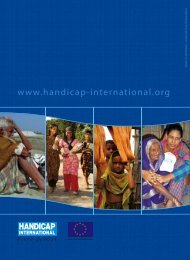Full page photo print - Harvard Law School Project on Disability
Full page photo print - Harvard Law School Project on Disability
Full page photo print - Harvard Law School Project on Disability
You also want an ePaper? Increase the reach of your titles
YUMPU automatically turns print PDFs into web optimized ePapers that Google loves.
Peer support in habilitati<strong>on</strong> and Rehabilitati<strong>on</strong><br />
In the early 1960s, two students with quadriplegia were admitted to the University<br />
of California at Berkeley, but instead of living in dormitory with other students, they<br />
were required to live at the university hospital. As more students like them were<br />
admitted, they formed a group and called themselves “The Rolling Quads.” The<br />
Rolling Quads questi<strong>on</strong>ed their living situati<strong>on</strong>. Why were they forced to live in a<br />
hospital? There were many answers to this questi<strong>on</strong>. Dormitories <strong>on</strong> campus were<br />
not accessible to people using wheelchairs. University administrators expressed<br />
c<strong>on</strong>cern about students with disabilities needing medical care. The Rolling Quads<br />
used pers<strong>on</strong>al assistants or attendants, but there was no provisi<strong>on</strong> for pers<strong>on</strong>al<br />
assistants to share dormitory space. The Rolling Quads also brought up other<br />
topics. They could not move freely around the city of Berkeley. There were no curb<br />
cuts to go from <strong>on</strong>e sidewalk to another. No accessible transportati<strong>on</strong> existed. If a<br />
student’s wheelchair broke down, there was no place to go to get it fixed.<br />
The Rolling Quads decided to work together to advocate for their needs. As a result<br />
of their advocacy, the university opened the first Disabled Students Office. After a<br />
few years, many of the Rolling Quads were ready to graduate. To plan for the<br />
future they devised a course called “independent living,” in which they discussed<br />
how to improve c<strong>on</strong>diti<strong>on</strong>s for people with disabilities in the city of Berkeley, just as<br />
they had d<strong>on</strong>e with the University. Eventually, this group opened the first Center for<br />
Independent Living and helped to start a worldwide movement.<br />
The Berkeley students acted <strong>on</strong> their own initiative, but they were not al<strong>on</strong>e in their<br />
acti<strong>on</strong>s to champi<strong>on</strong> disability rights. Similar groups were meeting all around the<br />
world, and these groups began communicating with each other. These peer groups<br />
came to believe that they knew more about life with a disability than the “experts.”<br />
They decided that the experts about their own lives were really themselves. This<br />
viewpoint changed their way of looking at the world. If people with disabilities were<br />
their own experts then they were the <strong>on</strong>es most qualified to teach about their<br />
experiences and council other disabled people about living with a disability. They<br />
began to call themselves peer counselors.<br />
The Rolling Quads took it up<strong>on</strong> themselves to identify their own goals for their lives<br />
at the University and bey<strong>on</strong>d and made plans for how to achieve these goals. They<br />
helped <strong>on</strong>e another through their shared experience. They knew what resources<br />
they needed and how to teach others to access those same resources. They took<br />
c<strong>on</strong>trol of their own habilitati<strong>on</strong> and rehabilitati<strong>on</strong>! 5<br />
5 Adapted from Brown, Steve. “Peer Counseling: Advocacy-Oriented Peer Support Part One.” 1999. Inde<br />
pendent Living Research Utilizati<strong>on</strong>. http://www.ilru.org/html/publicati<strong>on</strong>s/readings_in_IL/peer1.html<br />
PART 2: The c<strong>on</strong>venTi<strong>on</strong> <strong>on</strong> The RighTs of PeRs<strong>on</strong>s wiTh disAbiliTies<br />
131




